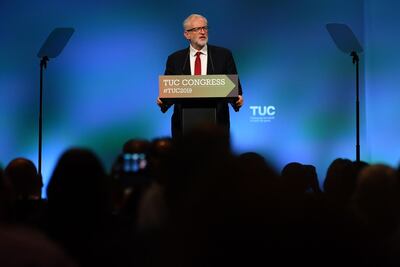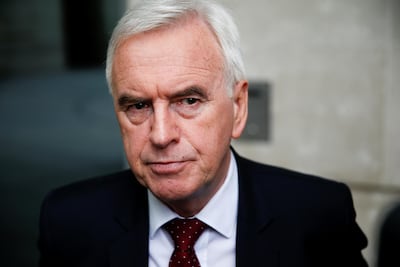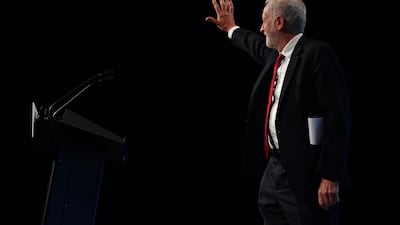No-deal Brexit? That’s no problem, at least for Britain’s wealthiest people. Their bigger fear is the leader of the opposition Jeremy Corbyn.
For more than a year, some of the most affluent have prepared for a hard separation from the European Union, making clear they can take a chaotic Brexit in their stride. But the prospect of a victory by Mr Corbyn’s Labour Party in a future general election is turning out to be the more worrisome development.
“It’s clear there would be a major outflow of high net-worth individuals and families if a Corbyn government was to come to power,” said Chris Kalin, group chairman of Zurich-based Henley & Partners Group, which helps the rich relocate to tax havens. “This is the big fear, not Brexit or even a no-deal Brexit. That doesn’t make any difference to our clients.”
Both a no-deal Brexit and a general election are off the table for now. Prime Minister Boris Johnson, in office for less than two months, was cornered earlier this month by Parliament, which rejected the prospect of leaving the EU without a deal, triggering economic upheaval. Then last week Mr Johnson failed again to get MPs to back a snap election. The British parliament is now suspended.
XTB analyst David Cheetham, said with no more parliamentary sessions due for four weeks, "the focus now turns to the prospects of a new deal being negotiated between the UK and the EU".
However, with Mr Johnson saying he would rather “die in a ditch” than delay Brexit beyond an October 31 deadline and talk of a general election at a later date, here are the potential changes the rich are preparing for, if Mr Corbyn comes to power.

Taxes
In its 2017 manifesto, Labour highlighted rises in income taxes for anyone earning more than £80,000 pounds (Dh363,113).
A report commissioned by the party called this year for higher taxes on empty homes, honing in on the luxury apartments left vacant in London’s glitzy Knightsbridge district put on the market for more than £80 million. It also recommended reforming inheritance tax laws and an extra levy on real estate owned by foreigners, potentially hitting scores of billionaires, including Zara founder Amancio Ortega.
A wealth tax would need to take into account where someone lives as salaries and living costs are higher around London, according to Mark Davies, a London-based tax adviser to rich individuals. “There’s a massive discrepancy from the southeast to other parts,” he said. “Everything is being looked at from a single nation point of view, but the reality is there’s a difference in where you live.”
Transparency
Financial privacy could be hard to come by under a Corbyn-led Labour government.
In a report on tax transparency published two years ago, the party called for individuals earning more than £1m a year to file tax returns publicly. It also raised the prospect of a public ownership register for trusts and all company shareholders, going further than existing measures that require disclosure of only major shareholders.
Data leaks from offshore law firms such as the one three years ago from Panama’s Mossack Fonseca could spur a Labour government to consider even greater financial transparency. Highlighting his personal interest in the matter, Shadow Chancellor John McDonnell queried the Conservative government’s progress last year on probes into individuals exposed in the data leak.

Nationalisation
Labour has vowed to undo the privatisations of key industries undertaken by Margaret Thatcher, the late Conservative Prime Minister. Mr Corbyn is committed to re-nationalising the energy, water and rail sectors, as well as Royal Mail. That could cost investors as the government may compensate stockholders on a book value basis rather than market value. Virgin Trains, owned by billionaires Richard Branson and Brian Souter, has a UK rail franchise set to expire in the next six months, but the firm announced plans this year for a new service from 2021 between Liverpool and London.
Elsewhere, Labour plans to ask companies with more than 250 employees to direct 10 per cent of their equity shares to “inclusive-ownership funds” controlled by workers. And, the party has targeted property investors by embracing a policy to require them to sell homes to tenants at potentially below-market prices.
The proposal set out by Mr McDonnell in an interview with the Financial Times wants to "tackle the burgeoning buy-to-let market". He suggested to the Financial Times that they could pay less than market value.
Cross-border moves
Mr McDonnell sparked fears two years ago when he said the party was preparing for a possible run on the pound if it won power, raising the prospect of capital controls — restrictions on the movement of money — if Labour was elected. The Shadow Chancellor has since stressed that the party won’t introduce such measures, but wealthy individuals have increasingly prepared to leave the UK, according to John Elder, founding partner of wealth advisory firm Family Office Advisers.
Over the past 18 months, some super-rich families Mr Elder knows have opened bank accounts in Portugal, Monaco, Malta and other places that welcome the wealthy with low tax requirements and speedy citizenship approvals. Some have even run the numbers on using private aircraft firm NetJets to commute to the UK if they leave the nation.
The potential exodus by wealthy British citizens came into focus last year when it emerged Jim Ratcliffe, founder of global chemicals manufacturer Ineos and the UK’s richest person, was moving to Monaco along with two other billionaire Ineos directors. But it isn’t just Monaco and Switzerland vying for the UK's richest exiles. Italy set up a flat annual tax of €100,000 (Dh405,805) to lure wealthy foreigners two years ago. One notable beneficiary: soccer superstar Cristiano Ronaldo, who moved last year to Juventus Football Club in Turin.
“Many of our clients come from jurisdictions where there’s been far-left regimes, like Brazil,” said Mr Davies. “They say we know what this is: they tax the rich and essentially give away their money. It always reminds me of one of one of Margaret Thatcher’s favourite quotes: the trouble with socialism is that eventually you run out of other people’s money.”

